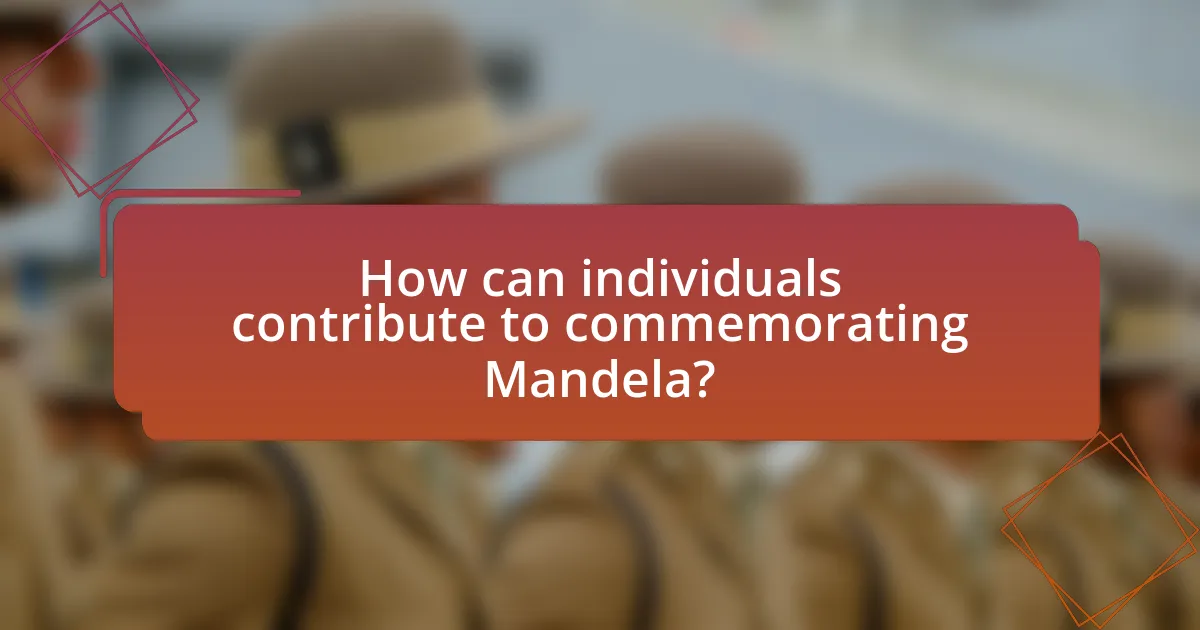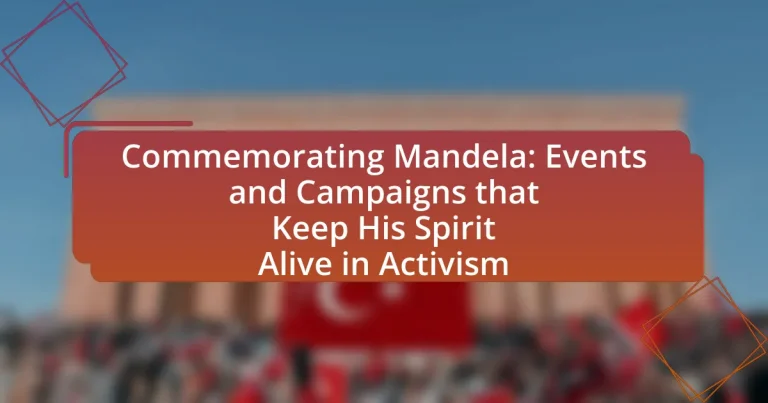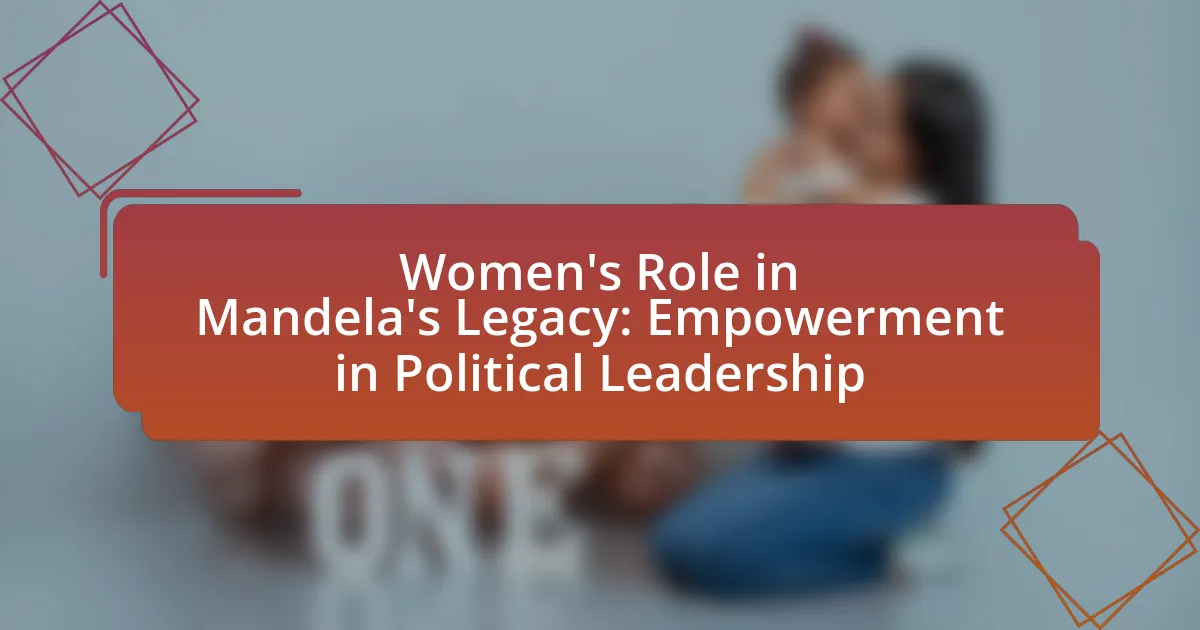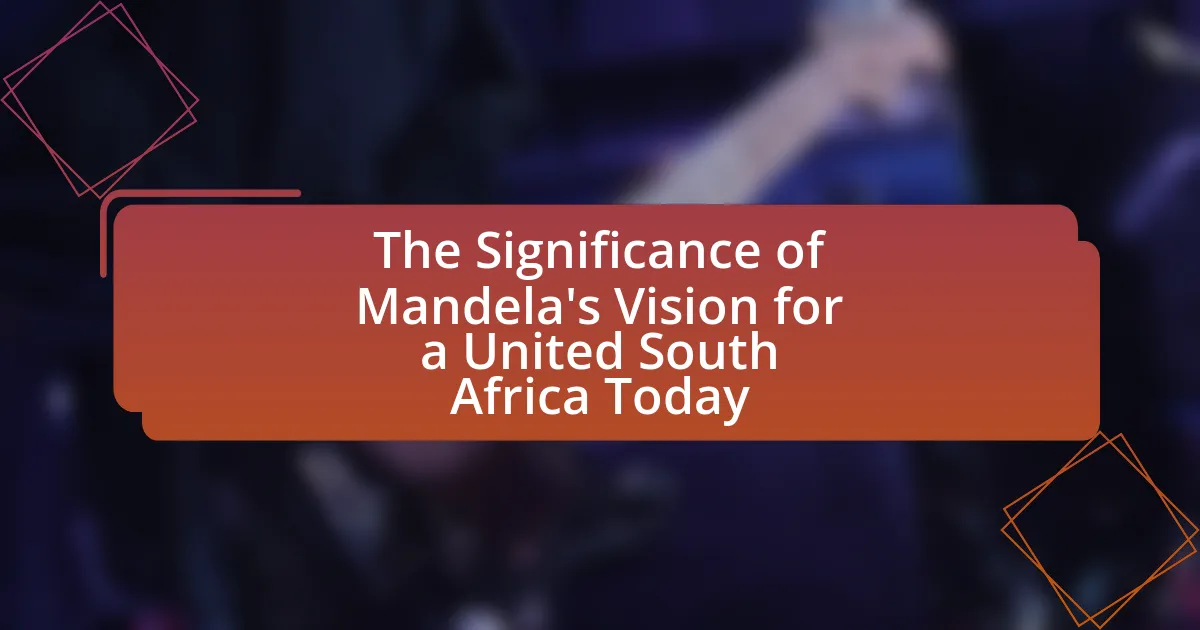The article focuses on commemorating Nelson Mandela and the various events and campaigns that perpetuate his legacy in activism. Key events include Nelson Mandela International Day, which encourages community service, and the annual Nelson Mandela Lecture that addresses social justice issues. The article highlights how these events reflect Mandela’s values of equality and human rights, the themes of social justice and resilience they promote, and their relevance to contemporary social issues. Additionally, it discusses the role of organizations like the Nelson Mandela Foundation in leading initiatives that engage communities and inspire ongoing activism in his name.
What are the key events commemorating Mandela’s legacy?
Key events commemorating Mandela’s legacy include Nelson Mandela International Day, celebrated annually on July 18, which encourages global citizens to dedicate 67 minutes of their time to community service, reflecting Mandela’s 67 years of activism. Additionally, the annual Nelson Mandela Lecture, hosted by the Nelson Mandela Foundation, features prominent speakers addressing social justice issues, furthering Mandela’s vision for equality and human rights. The unveiling of statues and memorials, such as the Nelson Mandela statue in Parliament Square, London, also serves to honor his contributions to freedom and democracy. These events collectively reinforce Mandela’s enduring impact on activism and social change.
How do these events reflect Mandela’s values and principles?
The events commemorating Mandela reflect his values and principles by promoting social justice, equality, and reconciliation. For instance, initiatives like the Nelson Mandela International Day emphasize community service and encourage individuals to contribute to societal improvement, aligning with Mandela’s belief in the power of collective action for change. Additionally, campaigns advocating for human rights and anti-apartheid movements resonate with Mandela’s lifelong commitment to fighting oppression and advocating for the marginalized. These events serve as a testament to his legacy, reinforcing the importance of activism in achieving a just society.
What specific themes are highlighted in these commemorative events?
The specific themes highlighted in commemorative events for Mandela include social justice, equality, and human rights. These themes reflect Mandela’s lifelong commitment to fighting against apartheid and advocating for the rights of marginalized communities. Events often emphasize the importance of unity and collective action in achieving social change, showcasing Mandela’s belief in the power of community engagement. Additionally, themes of resilience and hope are prevalent, illustrating how Mandela’s legacy inspires ongoing activism and the pursuit of a more equitable society.
How do these themes resonate with current social issues?
The themes of commemorating Mandela resonate with current social issues by highlighting the ongoing struggles for racial equality, social justice, and human rights. Mandela’s legacy serves as a powerful reminder of the fight against systemic oppression, which remains relevant today as movements like Black Lives Matter and global protests against inequality continue to gain momentum. These movements draw inspiration from Mandela’s principles of resilience and activism, emphasizing the need for collective action to address injustices such as police brutality, economic disparity, and discrimination. The continued relevance of Mandela’s themes is evidenced by the global recognition of International Nelson Mandela Day, which encourages individuals to take action in their communities, reflecting the enduring impact of his message on contemporary social issues.
What role do international observances play in honoring Mandela?
International observances play a crucial role in honoring Nelson Mandela by promoting awareness of his legacy and values, such as equality, justice, and human rights. These observances, including Mandela Day on July 18, encourage individuals and organizations worldwide to engage in community service and activism, reflecting Mandela’s commitment to social change. For instance, the United Nations declared July 18 as Nelson Mandela International Day in 2009, emphasizing the importance of taking action to improve the world in his honor. This global recognition fosters a collective memory of Mandela’s contributions and inspires ongoing efforts to address social injustices, thereby keeping his spirit alive in contemporary activism.
Which global events are dedicated to Mandela’s memory?
Global events dedicated to Mandela’s memory include Nelson Mandela International Day, observed annually on July 18, which encourages individuals to spend 67 minutes volunteering in honor of Mandela’s 67 years of public service. Additionally, the annual Mandela Memorial Lecture, organized by the Nelson Mandela Foundation, serves as a platform for discussions on social justice and human rights, reflecting Mandela’s legacy. These events are recognized worldwide, promoting Mandela’s values of peace, reconciliation, and social justice.
How do these international observances promote activism?
International observances promote activism by raising awareness and mobilizing communities around specific social issues. These events, such as Nelson Mandela International Day, encourage individuals and organizations to engage in volunteerism and advocacy, fostering a sense of collective responsibility. For instance, Mandela Day inspires millions to dedicate 67 minutes of their time to community service, reflecting Mandela’s 67 years of activism. This direct call to action not only honors his legacy but also galvanizes support for ongoing struggles against inequality and injustice, evidenced by the increased participation in social movements and charitable initiatives during these observances.
What campaigns are actively keeping Mandela’s spirit alive?
Campaigns actively keeping Mandela’s spirit alive include the Nelson Mandela Foundation’s initiatives, which focus on social justice, human rights, and education. The foundation promotes Mandela Day, encouraging individuals to dedicate 67 minutes of their time to community service, reflecting Mandela’s 67 years of activism. Additionally, the “Mandela: The Official Exhibition” travels globally to educate people about his life and legacy, fostering discussions on equality and justice. These campaigns are supported by various organizations and individuals committed to upholding Mandela’s values and principles, ensuring his impact continues to inspire future generations.
How do these campaigns engage communities in activism?
These campaigns engage communities in activism by fostering collective action and promoting social justice initiatives inspired by Mandela’s legacy. They utilize educational programs, community events, and social media outreach to raise awareness about pressing issues, encouraging individuals to participate in local and global movements. For instance, campaigns often organize workshops and discussions that highlight Mandela’s principles of equality and human rights, motivating community members to take action. Additionally, statistics show that participation in such campaigns can lead to increased civic engagement, with studies indicating that communities involved in activism report higher levels of social cohesion and empowerment.
What strategies are employed to mobilize support for these campaigns?
Strategies employed to mobilize support for campaigns commemorating Mandela include grassroots organizing, social media engagement, and partnerships with local and international organizations. Grassroots organizing involves community outreach to raise awareness and encourage participation in events, fostering a sense of collective action. Social media engagement leverages platforms like Twitter and Facebook to disseminate information rapidly, connect with supporters, and create viral campaigns that amplify the message. Partnerships with organizations such as the Nelson Mandela Foundation enhance credibility and expand reach, allowing for collaborative events that draw larger audiences. These strategies have proven effective in increasing visibility and participation in campaigns that honor Mandela’s legacy.
How do these campaigns address contemporary challenges?
These campaigns address contemporary challenges by promoting social justice, equality, and human rights, reflecting Nelson Mandela’s legacy. For instance, initiatives like the “Mandela Day” encourage individuals to dedicate 67 minutes of their time to community service, directly tackling issues such as poverty and education inequality. Additionally, campaigns that focus on anti-racism and climate justice resonate with current global movements, mobilizing support and raising awareness about systemic injustices. By aligning their objectives with pressing societal issues, these campaigns not only honor Mandela’s contributions but also inspire collective action to confront and resolve contemporary challenges.
What organizations are leading the charge in Mandela’s name?
The organizations leading the charge in Mandela’s name include the Nelson Mandela Foundation, which focuses on promoting his legacy through social justice initiatives, and the African National Congress (ANC), which continues to advocate for the principles he stood for in South Africa. The Nelson Mandela Foundation engages in various programs aimed at education, human rights, and community development, reflecting Mandela’s commitment to equality and social change. The ANC, as the ruling party in South Africa, upholds Mandela’s vision of a democratic society and works towards addressing ongoing social and economic challenges.
What initiatives are these organizations currently pursuing?
Organizations commemorating Mandela are currently pursuing initiatives focused on social justice, education, and community empowerment. For instance, the Nelson Mandela Foundation is actively promoting campaigns that address inequality and human rights issues, while also facilitating educational programs that highlight Mandela’s legacy and values. Additionally, various NGOs are organizing events such as community dialogues and workshops aimed at fostering leadership skills among youth, thereby ensuring that Mandela’s spirit of activism continues to inspire future generations. These initiatives are supported by historical evidence of Mandela’s commitment to social change, which remains a guiding principle for these organizations.
How do these initiatives align with Mandela’s vision for equality?
These initiatives align with Mandela’s vision for equality by promoting social justice, inclusivity, and human rights, which were central tenets of his activism. Mandela believed in dismantling systemic inequalities and fostering a society where all individuals, regardless of race or background, have equal opportunities. For instance, campaigns that focus on education access and economic empowerment directly reflect his commitment to uplifting marginalized communities, as evidenced by his establishment of the Nelson Mandela Foundation, which advocates for social change and equality.

How can individuals contribute to commemorating Mandela?
Individuals can contribute to commemorating Mandela by participating in community service and activism that reflects his values of equality and justice. Engaging in local initiatives, such as volunteering for organizations that support human rights or education, honors Mandela’s legacy. For instance, the Nelson Mandela Foundation encourages people to dedicate 67 minutes of their time to community service on Mandela Day, which is celebrated on July 18, marking his birthday. This initiative is rooted in Mandela’s 67 years of public service and aims to inspire individuals to take action in their communities, thereby keeping his spirit alive through tangible contributions to society.
What actions can individuals take to honor Mandela’s legacy?
Individuals can honor Mandela’s legacy by actively promoting social justice and equality. Engaging in community service, supporting anti-racism initiatives, and advocating for human rights reflect Mandela’s commitment to these values. For instance, participating in campaigns like the 67 Minutes for Mandela, which encourages people to dedicate 67 minutes of their time to community service on Mandela Day, directly aligns with his vision of giving back to society. Additionally, educating oneself and others about Mandela’s life and the struggles against apartheid fosters awareness and inspires action towards equality, reinforcing the principles he stood for.
How can grassroots movements amplify Mandela’s message?
Grassroots movements can amplify Mandela’s message by mobilizing communities around social justice, equality, and human rights, reflecting his core values. These movements often utilize local networks to raise awareness, organize events, and advocate for policy changes that align with Mandela’s vision of a fair and just society. For instance, the global “Black Lives Matter” movement echoes Mandela’s fight against systemic racism and has inspired local actions that promote equality and justice, demonstrating the enduring relevance of his message. Additionally, grassroots campaigns can leverage social media to spread Mandela’s ideals, reaching wider audiences and fostering solidarity among diverse groups, thereby ensuring that his legacy continues to inspire new generations in the struggle for freedom and equality.
What resources are available for individuals looking to get involved?
Individuals looking to get involved in commemorating Mandela can access various resources, including official websites of organizations dedicated to his legacy, such as the Nelson Mandela Foundation. This foundation provides educational materials, event information, and volunteer opportunities that promote Mandela’s values of social justice and human rights. Additionally, local community centers and activist groups often host events and campaigns that align with Mandela’s principles, offering platforms for participation and engagement. These resources facilitate active involvement in initiatives that honor Mandela’s contributions to activism and inspire continued efforts for equality and justice.
What best practices can enhance the impact of commemorative efforts?
To enhance the impact of commemorative efforts, it is essential to engage the community actively and ensure inclusivity in the planning process. Engaging local communities fosters a sense of ownership and relevance, which can significantly increase participation and emotional investment in the commemorative activities. For instance, studies have shown that events that incorporate local voices and stories resonate more deeply with participants, leading to a more profound impact. Additionally, utilizing diverse platforms for outreach, such as social media and local events, can broaden the audience and encourage wider participation. Research indicates that campaigns that leverage multiple channels see a 30% increase in engagement compared to those that rely on a single medium. Therefore, community engagement and multi-platform outreach are best practices that can significantly enhance the effectiveness of commemorative efforts.
How can collaboration between organizations strengthen campaigns?
Collaboration between organizations can strengthen campaigns by pooling resources, expertise, and networks to amplify impact. When organizations unite, they can share knowledge and best practices, leading to more effective strategies and innovative solutions. For instance, a study by the Stanford Social Innovation Review found that collaborative efforts can increase campaign reach by up to 50%, as organizations leverage each other’s audiences and platforms. This synergy not only enhances visibility but also fosters a sense of community and shared purpose, which can motivate greater public engagement and support for the campaign’s goals.
What role does education play in sustaining Mandela’s legacy?
Education plays a crucial role in sustaining Mandela’s legacy by promoting social justice, equality, and critical thinking among future generations. Mandela believed that education is the most powerful weapon for changing the world, as evidenced by his establishment of the Nelson Mandela Foundation, which focuses on education as a means to empower individuals and communities. This foundation supports various educational initiatives, including literacy programs and scholarships, aimed at fostering leadership and civic responsibility. By equipping young people with knowledge and skills, education helps to perpetuate Mandela’s vision of a more equitable society, ensuring that his ideals continue to inspire activism and social change.




